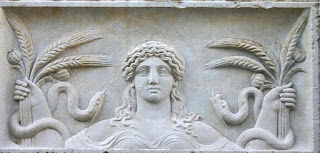This is not Isaac Asimov's
Foundation.
That's not necessarily a bad thing. The original trilogy is clunky. Most of it is characters plotting at one another in rooms of different sizes: Courtrooms, boardrooms, groundcars, abandoned factories, starship cockpits, hotel rooms, apartments. It's often hard to conjure up an image of what's happening, because Asimov provides so little descriptive detail. Until Foundation and Empire, its characters are mostly default white guys. Asimov's prose is workmanlike, but nothing exceptional (although he does have a gift for the occasional character detail - the "pudgy hands" of a man feigning murderous outrage, for instance).
So why is the trilogy considered a masterpiece?
1. It starts with a grand idea, and sticks with it. For the first one and a half novels, everything is about how Seldon's Plan works out its psychohistorical necessity. In the second half, everything is about restoring the plan after it's fractured by a literally unforeseeable event.
2. It works beautifully in terms of the nuts and bolts of craft. There are no idle characters or story elements in these books: Every character has a purpose, and they work ruthlessly toward it without hesitating or whining or pondering their place in the cosmos. If you're looking for stories that drive forward like clockwork, Foundation is your SF go-to.
3. It conveys a sense of historical time. Better, it has the audacity to try to convey a sense of historical time.
So far, AppleTV's Foundation is none of this.
Positives: When it comes to lush physicality, Asimov was lacking, but the TV series is not. In fact, the opening episodes are the most gorgeous SF I've seen on TV in...maybe ever. The decadence of the Empire is laid out on the screen in saturated red, blue, and black with glittering gold and silver highlights. Architecture overwhelms people. Every space, every costume, is crammed with detail. It has grandeur. Also, the people of the Empire are all the colors of the rainbow, and not uniformly male.There are some interesting ideas that could have been the bases of their own series [like the "genetic dynasty" of the Cleons].
BUT...
The TV series seems to have abandoned the fundamental rules of psychohistory...and those are the core of the trilogy. Real quickly, here they are:
1. Psychohistory can predict the future, but only the futures of large groups, like nations, empires, planets, or galaxies. The larger the group, the more accurate the prediction.
2. Psychohistorical predictions don't work if those groups are aware of the laws of psychohistory or the predictions themselves.
3. As a corollary of #1, the actions of individuals almost never have
much impact on major events. The best they can do is facilitate matters
that are already inevitable.
Anyone who has tried to write a story can see the trouble with these laws when it comes to narrative: If a character's actions don't matter in the grand scheme, why should a reader care? Asimov finessed the problem with stories in which the protagonists had foreground goals, while larger events took place in the background; with stories in which the characters' actions were full of derring-do but proved fruitless; with stories in which the characters take decisive action while fretting about the consequences of knowing too much about the future; with stories...well, you get the idea. He was brilliant at squaring the circle, and that's part of the fun of the trilogy.
The TV writers are less audacious, less interested in the idea, and more driven by Hollywood tropes that have been used a lot. In the TV version, psychohistory has devolved from a mathematical tool to an oracular power, a magical way of predicting the future. There is still lip service paid to the idea of math, but characters "see" the future basically by staring into a cloud of light motes which is meant to represent a mathematical display. [In the books, this "Prime Radiant" is just a convenient way of portraying complex formulae, the 20th century foreshadowing of a PowerPoint deck; on the TV show, it's portrayed as a semi-magical scrying device that can only rarely be activated except by those who are worthy.] At one point one character activates the display and asks her daughter if she can understand it. The daughter says "no," but this should never have even been a question: At least in theory, anyone with sufficient mathematical training should be able to figure it out, and no one without training should be able to. It's math, not magic; you shouldn't have to be a Chosen One to make it work...but you can see the Chosen One trope tugging at the writers' subconscious all the time.

They've also taken one of my favorite characters and changed him from a cigar-chewing pacifist politician based on Fiorello LaGuardia to a moody young "warden" with an enormous gun who knows she is "different" from the other settlers. Sure, not a Chosen One at all.
The series has not veered irreparably away from the Seldon Plan yet. But the primary indices don't look great.




